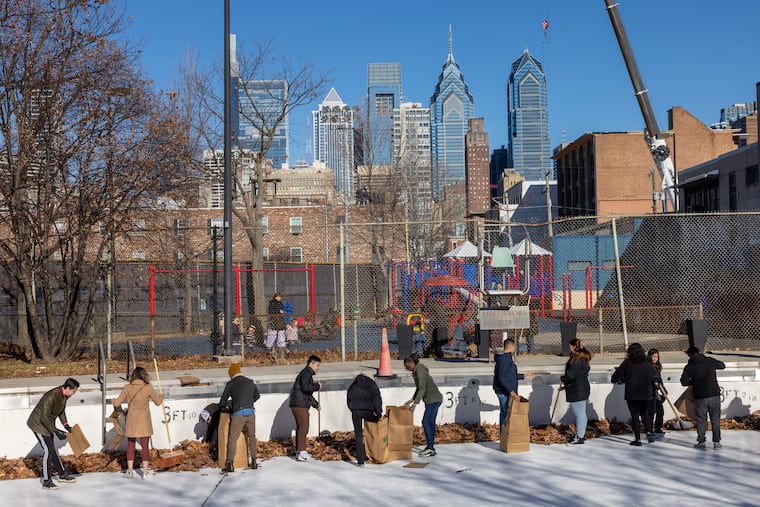Across Philadelphia region, thousands honor Martin Luther King Jr.’s legacy of social justice through service
Gun violence loomed large throughout the day for volunteers, organizers, and elected officials who said addressing it is a matter of racial justice.

Charlie Hills stood in front of a giant photo of the civil rights icon and legendary singer Marian Anderson. She looked over a sea of more than 200 volunteers and was a little overwhelmed.
Hills, a leader at the South Philadelphia recreation center named after Anderson, watched in awe Monday as the space swelled with people — from neighbors to the Temple University football team — who volunteered in remembrance of Dr. Martin Luther King Jr. to clean and paint the gym, the pool, and the basketball court.
“It’s astonishing to see,” Hills said. She said revitalizing rec centers is a community-driven way of preventing gun violence. “For so many of our youth, this is their second home.”
The recreation center was one of the hundreds of community hubs where tens of thousands of volunteers gathered Monday for the 28th annual Greater Philadelphia King Day of Service, considered the oldest and largest in the country. Some distributed food; some cleaned up trash; some marched for racial justice.
The day’s signature event was, for the 14th year, held at Girard College in North Philadelphia, where King in 1965 joined NAACP leader Cecil B. Moore and spoke to a massive crowd protesting for the school to be desegregated.
The theme this year was gun-violence prevention, and hundreds of volunteers assembled “antiviolence kits” that included gun locks and the phone numbers of resource groups. Several speakers noted that King — three years after speaking at Girard College — was himself a victim of gun violence.
“We cannot forget the impact his violent death had on his wife, Coretta Scott King, and his family,” said F. Christopher Goins, president of the school. “The victims of gun violence are not all dead. The survivors are victims as well, and we cannot forget about them today. We shall overcome.”
Karen Asper Jordan, president of the Cecil B. Moore Philadelphia Freedom Fighters, said solutions to the shootings crisis of today include education, economic prosperity, and uplifting the positive stories of Black Philadelphians.
She added: “There’s something for everybody to do.”
“Children were not born bad and doing bad things. We have to do better,” she said. “Our children have to learn their history … They have to know that they came from something, and that they’re going to be something.”
» READ MORE: Meet the artist who will finally give Marian Anderson her Philly place of honor
The reality of gun violence loomed large throughout the day, including for elected officials who said addressing it is a matter of racial justice. More than 1,000 people have been killed in the city over the past two years, an unprecedented toll driven largely by shootings.
Mayor Jim Kenney invoked the crisis Monday morning when he spoke to hundreds of supporters of the Barristers’ Association of Philadelphia, an association representing Black attorneys. At the group’s annual breakfast that recognizes lawyers and judges who have made contributions to the community, Kenney — who said he went off-script from his prepared remarks — said he sees a brighter future when he visits pre-K schools that were in part funded by his signature policy, the sweetened-beverage tax.
“We can’t lose them,” he said. “For every reported homicide, every reported 16-year-old, 17-year-old, 20-year-old who loses their life, and the person who pulled the trigger loses their life, I just think of those little babies, and what they could be, and who they’re going to be.”
More than a dozen elected officials attended the breakfast and the event at Girard College, including City Council members, a large contingent of Philadelphia’s delegation in the state legislature, and U.S. Sens. Bob Casey and John Fetterman.
In remarks at the breakfast, State Sen. Sharif Street (D., Philadelphia) said King’s legacy is “inextricably tied to Black lawyers and judges.”
“It was not demonstration for the sake of demonstration,” he said. “It was demonstration for the purpose of changing our unjust system to make it more just.”
That message was not lost on more than 200 volunteers who gathered in North Philadelphia to stuff 2,000 care packages of toiletries and other necessities for women returning home after being incarcerated. The annual event, called Serve Our Sisters, was organized by the national group Color of Change, a civil rights advocacy organization.
“The power of his legacy is ensuring service is embodied,” said Salaah Muhammad, the group’s regional field manager. “And not just this weekend. It’s bigger. How can we address systemic change every day?”